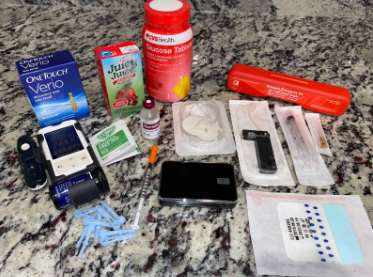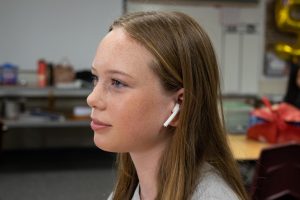Kennedy’s Journey

Kennedy uses these items to keep her health in check.
December 9, 2022
It’s 6:30 a.m. when Kennedy’s alarm goes off. She brushes her teeth and grabs her insulin pen, injecting it into her side and heading downstairs. She reaches into her pantry for a box of cereal, checking the carb count on the back. She examines her blood sugar levels on her Dexcom before slinging her backpack over her shoulder and heading out the door.
Kennedy J. was recently diagnosed with type 1 diabetes, a chronic disease where the pancreas cannot create enough insulin. Yet she refuses to let this condition restrict her daily life.
“It doesn’t run in my family. The doctors think I got it because I got a virus, and it attacked my pancreas.”
“I found out I had type 1 diabetes last year on February 18, so it’s pretty recent. I was freaking out, and I thought I was going to die because I didn’t understand what the doctor was trying to explain. I got scared because they said I could have gone into a coma if I didn’t go to the doctor when I did,” said Kennedy. “I was really thirsty, so I drank a lot of water and went to the restroom a lot. I didn’t want to eat anything, and I just felt sick.”
Despite the obstacle she had just encountered, Kennedy persevered, but not without the help of her family.
“My whole family was confused. My mom was terrified because she didn’t know what was happening, and my brother was crying because he was scared,” she said.
As a result of diabetes, Kennedy has found it difficult to concentrate in school. She sometimes has to go to the school nurse for medication or food to raise her blood sugar.
“It can be kind of distracting because sometimes when I’m in the middle of class, my blood sugar can get too high or low. I start getting headaches and it’s hard to focus.”
Food awareness determines more for Kennedy than the average student who may eat whatever or whenever they please or to fill an empty stomach.
“[To stay healthy] I take insulin shots before I eat to manage my carbs, so my blood sugar doesn’t go too high or too low,” said Kennedy.
She used to have trypanophobia (fear of needles) which made the insulin injection process challenging.
“When I first got it, I was really scared to take the shots. But [after a couple of weeks], I ended up doing it myself, and now I’m okay with it.”
Kennedy has overcome her fear and is now able to enjoy a typical day despite an incurable disease. But a daily routine is essential for her health.
“It affects my energy because if I get too high, I can get really tired and kind of delirious. I can pass out if I get too low, and I usually get really dizzy and can’t do anything,”
Kennedy has dietary solutions to address this reoccurring challenge. Sugar in fruit juice helps balance out the glucose levels in her blood.
“I drink apple juice to get [my sugar levels] back to normal. Diabetes affects my diet because I can only eat a certain amount of carbs. I can only eat 60 carbs per meal.”
Everything is subject to the glucose in the carbs that Kennedy eats. There is a limit to how much her body can handle. Though all of this can feel overwhelming, Kennedy remains resilient.
“Having an optimistic mind really helped me get through it when I first got diagnosed. It doesn’t really set me back anymore; I would say it’s a pretty normal thing and I’ve learned to work with it and around it.”





